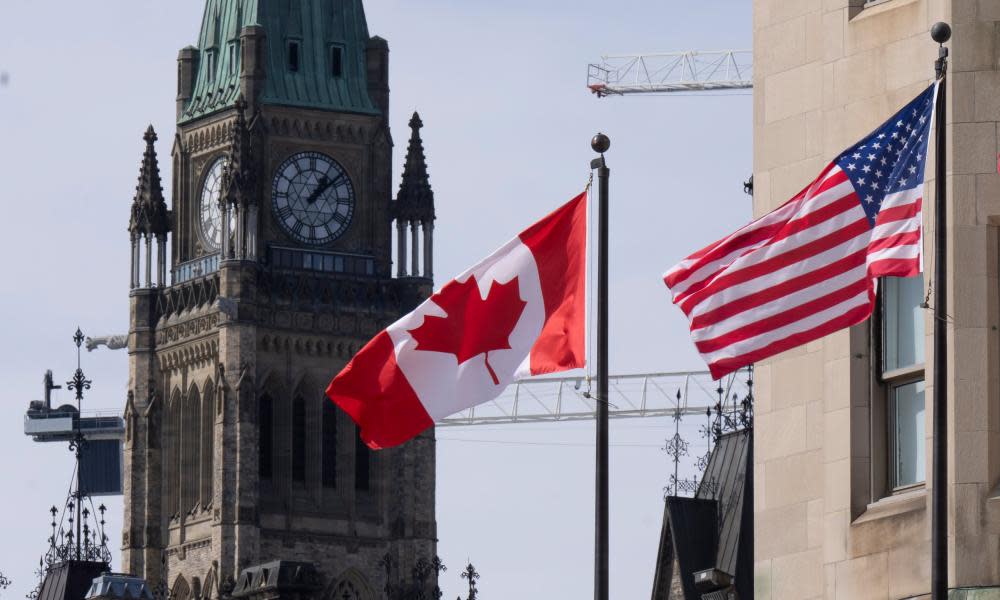Canadian lawmaker resigns following claims he secretly advised Chinese diplomat

- Oops!Something went wrong.Please try again later.
- Oops!Something went wrong.Please try again later.
- Oops!Something went wrong.Please try again later.
- Oops!Something went wrong.Please try again later.
A Canadian lawmaker has resigned from the governing Liberal party following allegations that he secretly met with a Chinese diplomat and advised Beijing not to release two Canadian captives.
Han Dong announced in the House of Commons late on Wednesday that he would sit as an independent. Global News reported that he met with Han Tao, China’s consul-general in Toronto in February 2021 and suggested officials in Beijing delay freeing Michael Kovrig and Michael Spavor, two Canadians being held by China at the time. He is also alleged to have suggested releasing the two men would benefit the rival Conservative party.
The two men spent nearly three years in Chinese jail cells and faced dubious espionage charges, widely seen as retaliation for Canada’s arrest of the senior Huawei executive Meng Wanzhou as a part of an American extradition request.
Dong confirmed to Global News that he spoke with Han Tao, but strongly denied the allegations had he advocated for a delay in release of the two jailed Canadians.
“Let me be clear. What has been reported is false, and I will defend myself against these absolutely untrue claims,” he said in parliament. “But let me assure you as a parliamentarian and as a person, I have never and I will never, and would never advocate or support the violation of the basic human rights of any Canadian, of anyone, anywhere, period.”
The allegations came amid persisting concerns over alleged Chinese political interference in Canada.
In a statement to parliament, Dong said he was resigning from the Liberals to avoid the perception of a conflict of interest.
“I’m taking this extraordinary step because to [sit] in the government caucus is a privilege and my presence there may be seen by some as a conflict of duty and the wrong place to be as an independent investigation pursues the facts in this matter,” Dong said as he read from a statement, at times becoming emotional.
“I want to assure Mr Michael Spavor and Mr Michael Kovrig and their families that I did nothing to cause them any harm,” he said.
Global News has cited two national security officials in their reporting, but neither the Guardian nor other major Canadian media outlets have been able to confirm the reporting.
Dong’s resignation marks the second time a lawmaker has chosen to sit as an independent following allegations of improper contact with Chinese officials.
On 10 March, the Ontario provincial lawmaker Vincent Ke resigned from the governing Progressive Conservative party amid allegations he was involved in efforts to interfere in Canada’s 2019 federal election. Ke has denied the allegations.
The prime minister’s office said in a statement it “only became aware that a conversation took place after Mr Dong told us, following recent media questions”.
In February, Global News also published a story that suggested the Canadian Security Intelligence Service (CSIS) believed Dong, who was re-elected in 2021, was a “witting affiliate” of Beijing’s election interference efforts.
At the time, Trudeau defended Dong.
“I want to make everyone understand fully that Han Dong is an outstanding member of our team and suggestions that he is somehow not loyal to Canada should not be entertained,” Trudeau said.
On Tuesday, Dong told reporters that he had not received help or contact from China during any federal elections.
“I was not offered, I was not told, I was not informed, nor would I accept any help from a foreign country, whether during my nomination or during my election campaign,” he said, adding he had not been contacted by either CSIS, the RCMP or Elections Canada.
The country’s national intelligence agency has repeatedly warned that China’s efforts to interfere in Canada’s democratic institutions represents a significant “strategic threat” to national security.
Trudeau has ordered two committees to study China’s interference in the 2019 and 2021 elections. He has also appointed David Johnston as a “special rapporteur” on the issue. The former governor general has until 23 May to determine if a public inquiry is needed, something political leaders in both the Conservative and New Democratic parties have called for.
Earlier this week, opposition parties emerged victorious in a standoff with the Liberals in a bid to have a senior member of Trudeau’s staff testify in parliament to determine when she and others were made aware of Chinese election interference efforts.

